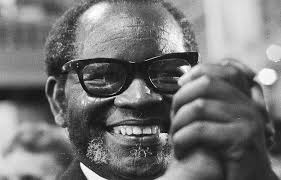Oliver Tambo was a South African anti-apartheid activist and leader of the African National Congress (ANC) during a pivotal time in the country’s history. His legacy as a freedom fighter is one that is still celebrated today, but his involvement in guerrilla activities has been a controversial topic.
Tambo was a key figure in the ANC’s struggle against apartheid, a system of racial segregation and discrimination enforced by the white minority government. Along with his comrades Nelson Mandela, Joe Slovo, and Walter Sisulu, Tambo was responsible for organizing and directing several attacks against the South African public as part of the ANC’s armed wing, Umkhonto we Sizwe (MK).
In a 1985 interview, Tambo acknowledged the difficulty of avoiding civilian casualties in the conflict, saying, “In the past, we were saying the ANC will not deliberately take innocent life. But now, looking at what is happening in South Africa, it is difficult to say civilians are not going to die.”
One of the most infamous attacks attributed to Tambo and the ANC was the Church Street bombing in Pretoria on May 20, 1983. The attack resulted in the deaths of 19 people and injuries to 197-217 others. The post-apartheid Truth and Reconciliation Commission (TRC) identified Tambo as the person who gave final approval for the bombing.
According to the ANC’s submission to the TRC, the attack was in response to a South African cross-border raid into Lesotho that killed 42 ANC supporters and civilians, as well as the assassination of Ruth First, an ANC activist and wife of Joe Slovo, in Maputo, Mozambique. The ANC claimed that 11 of the casualties in the Church Street bombing were South African Defense Force (SADF) personnel and therefore a legitimate military target.
However, the legal representative of some of the victims argued that many of the casualties were administrative staff, including telephonists and typists, who could not be considered a legitimate military target. The TRC found that the number of civilians versus military personnel killed was unclear, with South African Police statistics indicating that seven members of the SADF were killed, but at least 84 of the injured were SADF members or employees.
Ten MK operatives, including Aboobaker Ismail who commanded the unit responsible for the Church Street bombing, applied for amnesty for this and other bombings. The applications were opposed on various grounds, including that it was a terrorist attack disproportionate to the political motive. Ultimately, the TRC granted amnesty to the operatives.
Tambo’s involvement in guerrilla activities has been a source of controversy and debate. Some view him as a heroic freedom fighter who used any means necessary to fight against apartheid, while others criticize his actions as immoral and unjustifiable.
Despite the controversy surrounding his involvement in guerrilla activities, Tambo remains a revered figure in South African history. In 1985, he was re-elected as President of the ANC, a position he held until 1991. He played a pivotal role in the negotiations that led to the end of apartheid and the establishment of democracy in South Africa. His contributions to the struggle for freedom and justice in his country will not be forgotten.
